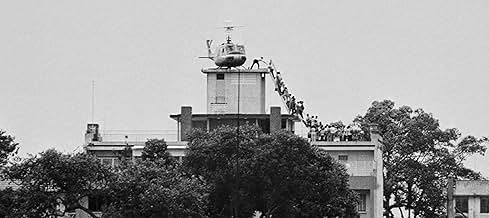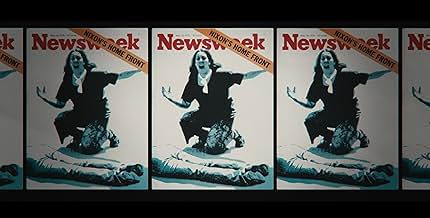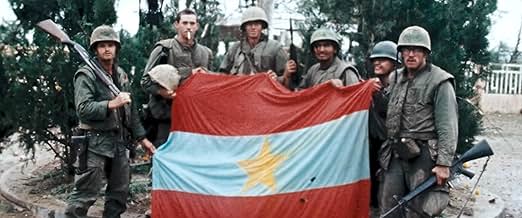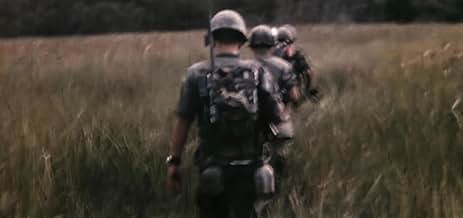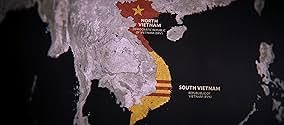Turning Point: La guerre du Vietnam
Titre original : Turning Point: The Vietnam War
- Mini-série télévisée
- 2025
- 1h 15min
Les effets profonds de la guerre du Vietnam sur l'identité américaine, provoquant des divisions sociales et érodant la confiance du gouvernement. Plus qu'une défaite militaire, elle a transf... Tout lireLes effets profonds de la guerre du Vietnam sur l'identité américaine, provoquant des divisions sociales et érodant la confiance du gouvernement. Plus qu'une défaite militaire, elle a transformé la politique et la culture des États-Unis.Les effets profonds de la guerre du Vietnam sur l'identité américaine, provoquant des divisions sociales et érodant la confiance du gouvernement. Plus qu'une défaite militaire, elle a transformé la politique et la culture des États-Unis.
Parcourir les épisodes
Avis à la une
There have been many excellent TV/streaming series on the Vietnam War and this is another. To be clear, the big events of the war, especially from the years 1965 to 1973 were amply addressed by the other series and the only thing different about this one is some of the interviewees are new.
Where the series adds something new is at the beginning and end of the conflict. The description of the early 20th century developments and the Kennedy years contained some material I don't remember from other series. Ditto for the period after the Paris Peace Treaty. For example, a representative of the Communists admitted they went too far in their postwar purge of the former South Vietnam. I don't remember the other series showing expressions of doubt or regret by the Communists. I think this speaker's regrets could be expressed more freely because relations between the US and Vietnam are so much better today.
Finally, I'm a little surprised that other reviewers suggest the series only shows the American perspective, the series interviews many Vietnamese from both sides of the conflict. While I think the series is perhaps it little more generous to some American critics of the war then they should have been, I don't get the criticism of Dan Rather's inclusion. He was covering the war throughout the entire period of heavy American involvement. He is certainly very critical of the effort in retrospect, but I suspect he was like Walter Cronkite and millions of other Americans in thinking it began as a noble cause.
Where the series adds something new is at the beginning and end of the conflict. The description of the early 20th century developments and the Kennedy years contained some material I don't remember from other series. Ditto for the period after the Paris Peace Treaty. For example, a representative of the Communists admitted they went too far in their postwar purge of the former South Vietnam. I don't remember the other series showing expressions of doubt or regret by the Communists. I think this speaker's regrets could be expressed more freely because relations between the US and Vietnam are so much better today.
Finally, I'm a little surprised that other reviewers suggest the series only shows the American perspective, the series interviews many Vietnamese from both sides of the conflict. While I think the series is perhaps it little more generous to some American critics of the war then they should have been, I don't get the criticism of Dan Rather's inclusion. He was covering the war throughout the entire period of heavy American involvement. He is certainly very critical of the effort in retrospect, but I suspect he was like Walter Cronkite and millions of other Americans in thinking it began as a noble cause.
Therefore the first question will be: is it worth to watch?
To make it short: Yes, today more than some years ago It is of course primarily from an US point of view, in spite of several Vietnamese interview partners.
Does it miss possibly important details as some critics here argue? Most likely as all major conflicts have deeper roots and more sideways as you have footage to make a documentary about, but IMHO the series provides such a plethora of footage that most of us will see something new and disturbing.
The Vietnam War, as many conflicts before and afterward are presented as an array of conflicting political and military decisions, when in the end they are just killing humans on both sides for no reason. 50 years from now we'll see a similar documentary about the Ukraine, if free speech is still possible.
To make it short: Yes, today more than some years ago It is of course primarily from an US point of view, in spite of several Vietnamese interview partners.
Does it miss possibly important details as some critics here argue? Most likely as all major conflicts have deeper roots and more sideways as you have footage to make a documentary about, but IMHO the series provides such a plethora of footage that most of us will see something new and disturbing.
The Vietnam War, as many conflicts before and afterward are presented as an array of conflicting political and military decisions, when in the end they are just killing humans on both sides for no reason. 50 years from now we'll see a similar documentary about the Ukraine, if free speech is still possible.
Some comments are unfair to say that the series presented Ho Chi Minh as a leader who only wanted to turn Viet Nam communist. Very early on (I think latter part of Ep 1 or Ep 2 onwards), they narrated how Ho Chi Minh banked on the USA history's of struggle for independence against Great Britain, and hoped that the US would likewise support Viet Nam's fight against the French. It also recognized that in Viet Nam, the war was known as an "American War" instead of "Vietnam War", acknowledging the dominant US-centric perspective in calling it the latter.
For the most part, I found this documentary balanced, only because when I find myself sympathizing (?) with one side, it would give another perspective that makes you realize that none of those involved were innocent - they all have blood on their hands for having no regard for non-combatants/civilians. It's materials like this that give us a chilling reminder that war is never the answer.
For the most part, I found this documentary balanced, only because when I find myself sympathizing (?) with one side, it would give another perspective that makes you realize that none of those involved were innocent - they all have blood on their hands for having no regard for non-combatants/civilians. It's materials like this that give us a chilling reminder that war is never the answer.
After Ken Burns' magisterial and monumental 18-hour deep dive into the Vietnam War, you'd think there'd be nothing left to say. But "Turning Point: The Vietnam War" on Netflix proves there's still room for new voices, especially from both North and South Vietnam, that bring fresh, essential perspectives to this complex and chaotic chapter of history. The series is balanced, detailed without dragging, and as harrowing as any account of America's decades-long misadventure. Fifty years after the fall of Saigon, this story remains urgent and deeply unsettling. Like Brian Knappenberger's earlier "Turning Point" series on 9/11 and the Cold War, it's clear-eyed, unflinching, and committed to telling the truth, warts and all. It's definitely a worthy watch.
I enjoy learning about 20th century American history, and the Vietnam War is one of my favorite documentary topics. I was initially concerned that this documentary would be filled with anti-American bias, however, it was much more balanced than I expected. The burning of villages by American/ARVN forces was discussed in one episode, for example, but it was also acknowledged that the North Vietnamese did a lot more of that kind of destruction. In one episode, a Viet Cong woman explains why she hated the Americans but also notes that many North Vietnamese didn't really understand what communism entailed. On the other hand, you had one million living in the North flee to the South when the civil war truce occurred, suggesting that many people did understand what life under communism meant (somewhat reminiscent of the East Germans escaping to West Germany, or maybe those Koreans living in the North who relocated to the South). To me this suggests the North Vietnamese victory was a pyrrhic one because while North Vietnam won, the people still didn't have most of the freedoms some people in the West take for granted nor the power. Of course, no more foreign control or interference. But I wonder if their lives changed for the better. We do know a million people from the South escaped (boat people) four years later.
Some critics have said that this documentary is a little too biased for their tastes. But I, someone who gets annoyed when I hear bias, didn't think so. To be sure, there was one guy in Episode 5 who annoyed me because I think he was being dramatic for the camera. Nevertheless, everyone else spoke in a measured way with occasional sincere emotions. All facts to me, and interesting perspectives, too. Some critics also suggest some important details were left out. I think this is true to some extent. No mention of the death of Ho Chi Min in 1969, for instance. I don't think General Giap was mentioned either. Still, I think for a five episode series, and given it's aim, it was wonderfully edited and directed. I love learning new details about subjects I'm already familiar with and this documentary did not disappoint.
I think the first 20-30 minutes of Episode 1 left me a little unclear how this documentary would play out. However, after that it started to grab my interest. As to be expected, there's a lot of sadness, grief, strife, and so on, on both sides. But don't take that as gratuitous anti-Americanism. Rather, I think the director was focused on telling a story from all points of view and how the Vietnam War permanently changed America and the relationship the American people has with their government because of it.
Some critics have said that this documentary is a little too biased for their tastes. But I, someone who gets annoyed when I hear bias, didn't think so. To be sure, there was one guy in Episode 5 who annoyed me because I think he was being dramatic for the camera. Nevertheless, everyone else spoke in a measured way with occasional sincere emotions. All facts to me, and interesting perspectives, too. Some critics also suggest some important details were left out. I think this is true to some extent. No mention of the death of Ho Chi Min in 1969, for instance. I don't think General Giap was mentioned either. Still, I think for a five episode series, and given it's aim, it was wonderfully edited and directed. I love learning new details about subjects I'm already familiar with and this documentary did not disappoint.
I think the first 20-30 minutes of Episode 1 left me a little unclear how this documentary would play out. However, after that it started to grab my interest. As to be expected, there's a lot of sadness, grief, strife, and so on, on both sides. But don't take that as gratuitous anti-Americanism. Rather, I think the director was focused on telling a story from all points of view and how the Vietnam War permanently changed America and the relationship the American people has with their government because of it.
Le saviez-vous
- AnecdotesAired on the 50th anniversary of the Fall of Saigon.
Meilleurs choix
Connectez-vous pour évaluer et suivre la liste de favoris afin de recevoir des recommandations personnalisées
Détails
- Date de sortie
- Pays d’origine
- Langue
- Aussi connu sous le nom de
- Turning Point: The Vietnam War
- Société de production
- Voir plus de crédits d'entreprise sur IMDbPro
- Durée
- 1h 15min(75 min)
- Couleur
Contribuer à cette page
Suggérer une modification ou ajouter du contenu manquant



